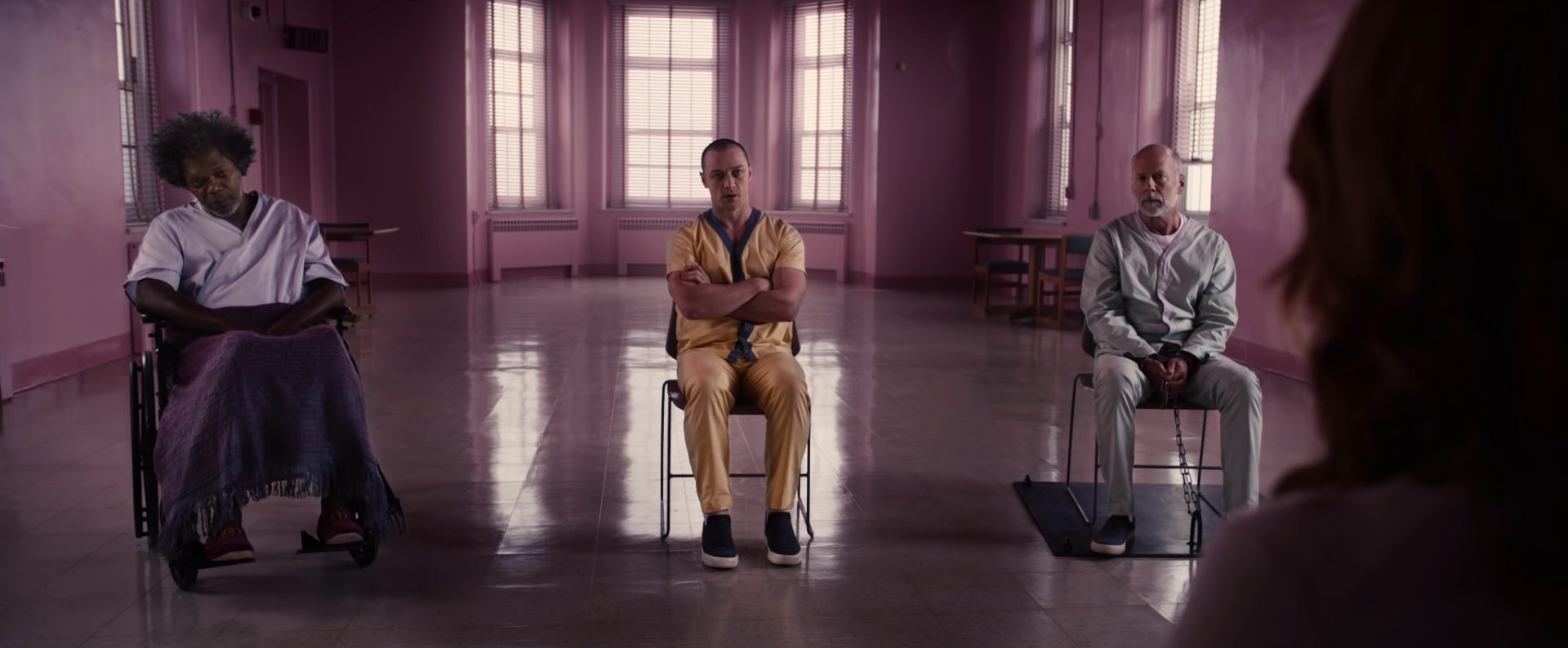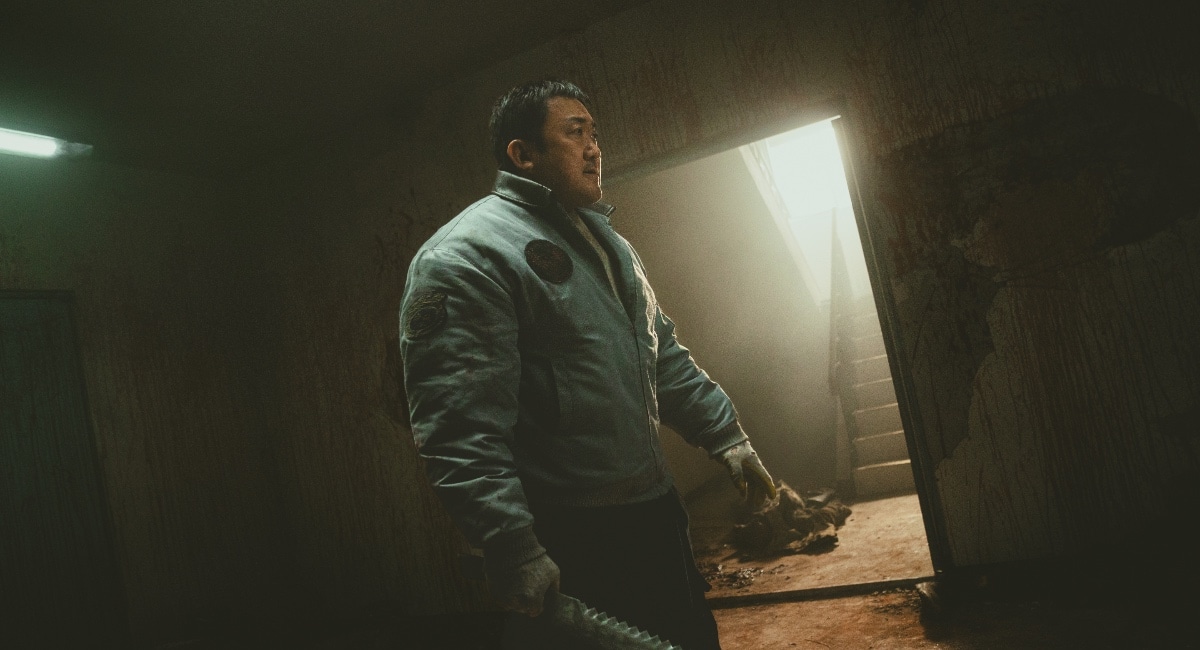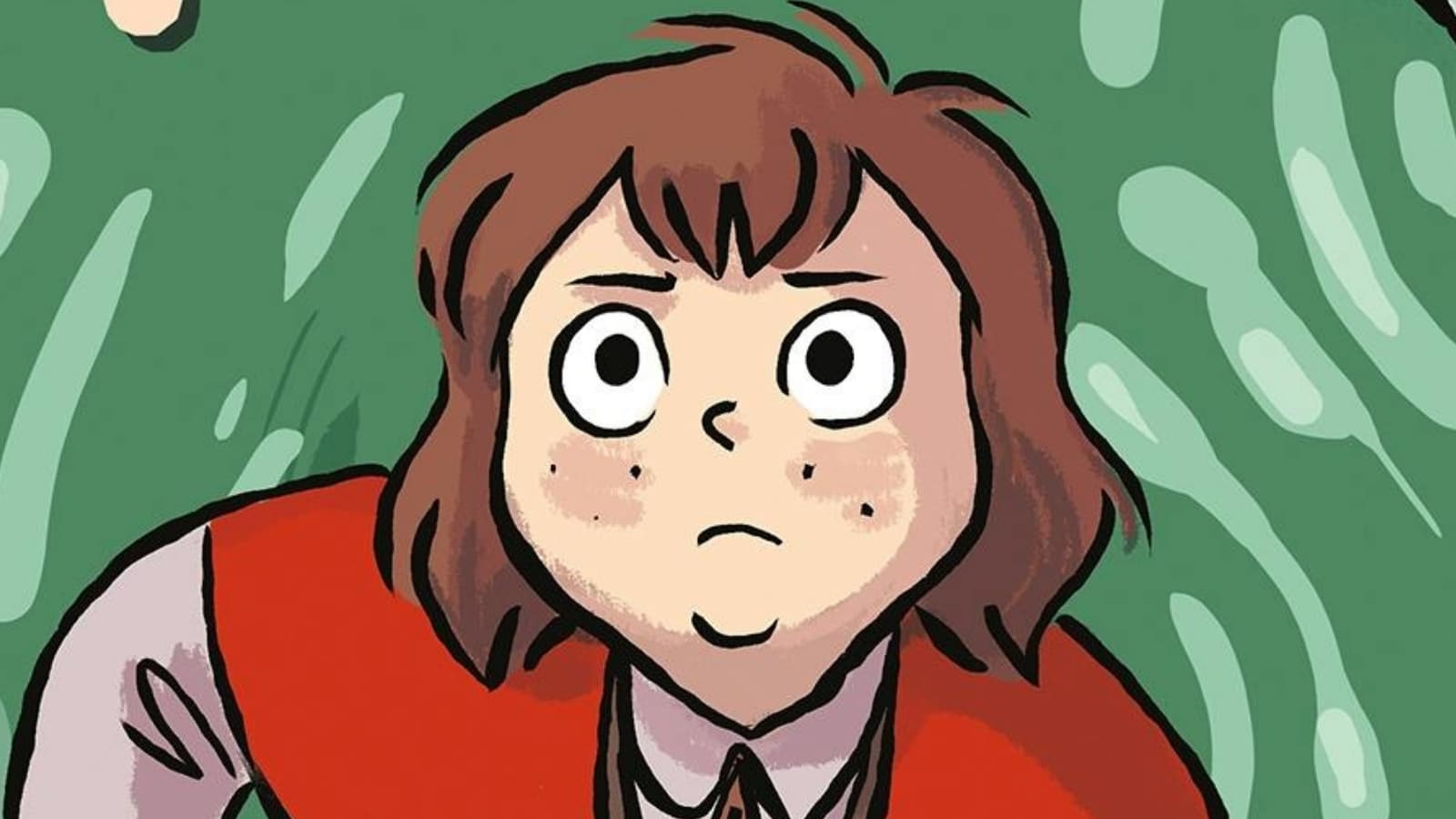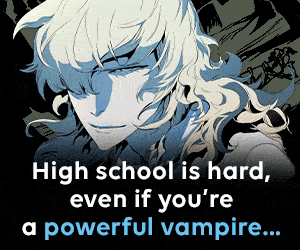Oh boy, what a disaster.
M. Night Shyamalan, he of probably two good films, probably? I know we all like The Sixth Sense, and most people claim to like Unbreakable, though everyone I’ve talked to in my real life remembers nary a thing about it. After that…yikes. I tend to veer towards the rather maligned The Village as a a guilty pleasure, at least when I watched in 2005. But the idea that the one-time “heir to Spielberg” has been on some kind of comeback trail has been a befuddling thing to experience. The Visit, his big “return to horror” was high on schlock and provided little else, whereas Split made for a nice vehicle for James McAvoy to chew scenery, and he’s very good – it nevertheless only amounted to a tease for what Shyamalan really wanted to do: a sequel to Unbreakable.
But just because you can do something, doesn’t mean you should. Poor David Dunn should have been allowed to rest in the back alleyways of our respective mind palaces.
Glass takes place years after Unbreakable, basically in real time. Bruce Willis returns as the titular hero of that film, and in a nice touch, Spencer Treat Clark returns to play his son, Joseph. They have a nice little set-up going, David as a particularly exhausted Batman-like figure “goes on walks” to take out various bad apples, and Joseph as his “Oracle”, gives him intel on his targets. But who David really has his eyes set on is the serial killer known as “The Horde”, which is where these two films collide.
And as it goes, the first 15 minutes of Glass is literally the confrontation that fans of these films have been waiting for. David tracks The Horde down, and they square off, and admittedly there’s a satisfying pleasure in seeing this super jacked-up bad guy come to face to face with someone who isn’t a helpless innocent. It’s a bit reminiscent of that bit midway in the first season of Heroes where Peter and Sylar come face to face. And then the first “twist” comes, such as it is: it turns out this isn’t going to be a typical clash of super-powered titans, because both the hero and villain are taken into custody and put into the care of psychiatrist Dr. Ellie Staple (Sarah Paulson). Suddenly, the high octane ride we were expecting is turned into a quiet contemplation of the respective psyches of these characters. You see, Staple specializes in patients who are convinced they are superheroes.
Yeah, this is where we’re going.
Unbreakable had its doses of metacommentary on superhero comics, and in 2000, ahead of the current boom cycle of these mega-billion dollar capes and tights franchises, it seemed rather novel. A case of “hey man, somebody finally gets us!” But now in a world where everyone knows Star Lord’s name, returning to that well unveils perhaps how little of the genre and even the medium that Shyamalan understands beyond the basic “good guys and bad guys exist in a constant struggle” chestnut and, even worse, that Grant Morrison-styled pap of “superheroes are our modern mythology! This stuff is important!” Watching poor Paulson deliver this wooden verbal excrement about my favorite hobby physically made my skin crawl at times, and it honestly gets even worse from there, once the title villain played by Samuel L. Jackson enters into the picture.
It’s a bummer. Jackson is an A+ comics fan from way back, and watching him basically own the Nick Fury role has been one of those small pleasures I get out of the MCU every time he gets a chance to pop up. But here, his long-awaited return as Elijah Glass, the only comic book critic to ever find fame and fortune (it was probably more because he was an art dealer, but I like the thought), is a massive disappointment. He’s got great plans for Kevin/The Horde, but it’s mostly just an excuse for Glass to talk at people about comic books. Frankly, I’m not sure there’s more than two lines of dialogue strung together by the villain that doesn’t somehow try to entertain this meta-notion. It worked fine as the end twist for Unbreakable, but it’s a tougher row to hoe when you’re trying to hang your whole movie on this idea that “comics are based on the reality that we don’t see.” And even that could work, but when characters are trying to force-feed the audience this stuff through Shyamalan’s ham-fisted dialogue, nothing connects. It becomes the sole focal-point of Glass for much of its running time, interspersed with tremendously bad scenes of Anya Taylor-Joy’s returning Casey Cooke trying to connect with her former tormentor from Split, ya know…the guy who killed her classmates? And then researching comic books to better understand him? For some reason?
And just when you think it’s all going to maybe just circle back to the beginning for a big third-act conclusion that might salvage the whole wreck, Shyamalan settles for a low-rent confrontation with some of the worst imaginable staging and CGI. While the film’s conclusion explains away the smaller scale of the final brawl, it doesn’t change the thuddingly inept execution. If you told me that the production just ran out of money, I’d believe you. On top of that, it’s very possible Willis may have only been around for about 3-4 days of shooting, he shows up so sparsely and many of his scenes might very well be someone else in his “costume” altogether.
I just felt embarrassed for almost everyone involved, save for maybe James McAvoy, whose work as The Horde continues to be pretty fun. It’s another big, “leaving teethmarks” type performance, but it’s honestly so entertaining and he’s clearly committed to the bit that it’s hard to not enjoy, if only anyone else was having as much fun.
Glass is the kind of movie that continues to pretend comics are still an “outsider pursuit” and demand to be taken so very seriously. Someone should tell Kevin Feige and every other studio head that’s trying to be him, because otherwise, I don’t know what cave Shyamalan has been living in all this time. Also, M. Night, a “limited edition” does not refer to the length of a series in comic. If you can’t get that right, how can I take anything else you have to say seriously when it comes to comics?
I should note that the director gives himself another distractingly awful walk-on role, but at this point would it even be a Shyamalan movie without that?
Oh well, at least Zack Soto’s wonderful adventure comic The Secret Voice gets a front and center cameo. I wish I had been reading that for two hours instead.












I liked Unbreakable a lot. In fact, it remains my favorite superhero movie. But all the M. Night movies I’ve seen since then … ugh. I still haven’t decided whether The Happening was a deadpan comedy or unintentionally hilarious. It was a laugh riot.
“Glass is the kind of movie that continues to pretend comics are still an “outsider pursuit” and demand to be taken so very seriously.”
That is how a lot of fans, particularly the older ones, see their hobby. They still see comics fans as members of a marginalized, persecuted minority. Incredible. And they’re very angry that Green Lantern isn’t taken as seriously as Maus or Love and Rockets.
The forced use of the phrase “Limited Edition” was one of M’s many crimes. Of course, it’s because that was the name of Elijah’s gallery, but it was SO awkward to hear as they used it.
Superhero comic readers make me embarrassed to like superhero comics.
I’m still looking forward to checking this movie out.
I plan to see it, too.
Split wasn’t THAT bad. It was far from great, but was M. Night’s best movie in over a decade. Not a high bar, I’ll admit, but at least it was watchable.
It seems cheap because it was, with a budget of just $20 million.
The original UNBREAKABLE just made me embarrassed that I’d ever liked M.Night Shyamalan.
Good comment by Abraham Reisman at Vulture, about what made “Unbreakable” special:
“There was no sci-fi mishegoss, no third-act battle royale, no epic special effects, no goofy quipping. It was a quiet tale, one that almost felt like a micro-budget indie, built on devastating performances from Willis and Jackson. It dared to lay bare the mechanics of superhero storytelling and ask us to pay close attention, rather than getting caught up in whiz-bang spectacle and self-referential gags. It had something to say: Superhero fiction can be beautiful and inspiring, but we should fear unhealthy obsession with it.
“Oh, how desperately we require a message like that right now, what with our cinematic spandex glut. …”
Then he goes on to write about how disappointing “Glass” is. Oh well!
Of course, the very things he praises about “Unbreakable” — “no third-act battle royale, no epic special effects” — are the very reasons why some fans find it dreary and boring. Fans gotta have their big CGI explosions!
I like The Village. Signature twist-about but it commits absolutely to the look and feel.
“some fans find it dreary and boring”
“Unbreakable” IS dreary and boring. The emotional and thematic tone deafness of it stands now like a great neon warning sign that stuff like “The Happening” and “The Lady in the Water” would be coming.
“Split” was a decent little flick that kept its head above water thanks to narrative density (even if the narrative wasn’t always that great) and McAvoy.
“Glass” isn’t quite as good as “Split” but it’s a damn sight better than M. Night’s worst.
Mike
Saw Unbreakable again this past fall (big-screen showing at local art house during our comic con) for the first time since it came out, and it definitely still stands up for exactly the reasons in the Vulture article quotation. It’s certainly way better than any of the live-action DC or Marvel movies. But I’m probably an atypical superhero fan: I can easily sit through My Dinner with Andre but the incredibly long and boring fight scenes in movies like Black Panther have me checking my watch.
Saw “Glass” yesterday, and it was … okay. Not a great movie, and not as good as “Unbreakable.” But not awful like so many reviews claim. It held my interest all the way, and unlike so many critics, I didn’t hate the ending.
JTL said: “I can easily sit through My Dinner with Andre but the incredibly long and boring fight scenes in movies like Black Panther have me checking my watch.”
Same here. Disney and Warner are apparently afraid fanboys will riot if they don’t get an endless CGI battle climax in every one of these movies. There are only so many ways you can show stuff blowing up, and multi-colored rays shooting from people’s hands or eyes, before it gets boring.
Yeah, I finally saw Aquaman last weekend, and it was so, so bloated with nonsensical fight scenes. I did notice that one fight sequence was scored with music reminiscent of 8-bit video games, and it really underscored to me that the primary cultural touchstone for these movies is primarily video games rather than comic books. (And I sometimes feel like the only comic book fan who has absolutely no interest in video games.)
“And I sometimes feel like the only comic book fan who has absolutely no interest in video games,:’
No, you’re not. I also have no interest in them. And I avoid any movie based on a video game. (Avoiding movies influenced by games can be harder.)
I can’t bring myself to see “Aquaman.” That would be like admitting cinema is dead, and dancing on its grave.
Looking forward to seeing “Stan and Ollie” next week.
For the life of me, I can’t quite explain why, but I was continually amused by the fact the the one identifiable comic in the psychiatrist’s office was “Watchman.” The fact that I was so fixated on that detail is probably evidence I wasn’t too caught up in the dirty.
Comments are closed.